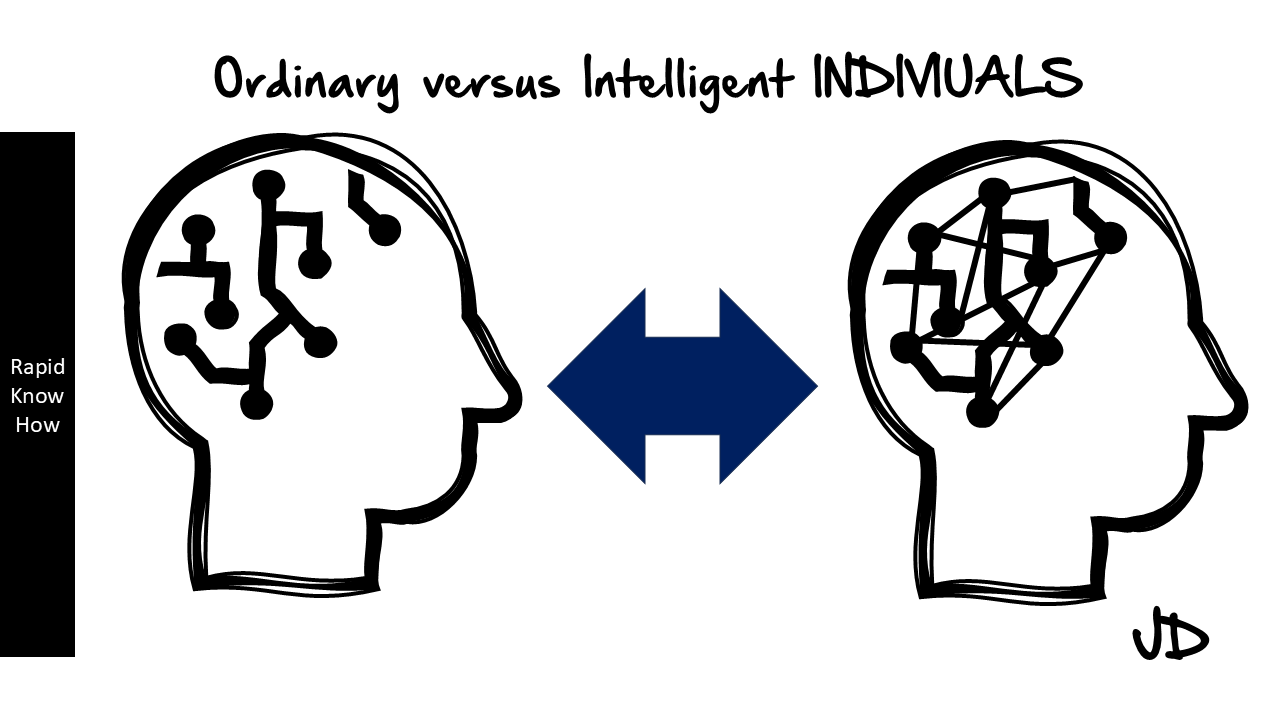Here are several concrete examples highlighting how intelligent individuals might approach issues differently compared to those with average intelligence:
1. Problem Solving in Mathematics
- Intelligent Individuals: When faced with a complex mathematical problem, they might break it down into smaller parts using advanced problem-solving strategies, like drawing diagrams, using algebraic formulas, or applying calculus concepts, leading them to the solution efficiently.
- Average Individuals: They might struggle to understand the problem holistically and may rely on rote memorization of formulas without grasping the underlying principles, causing frustration and a slower path to finding a solution.
2. Understanding Complex Texts
- Intelligent Individuals: They can quickly process dense academic or literary texts, recognizing themes, arguments, and nuances. They might take notes to synthesize information and make connections to broader contexts or other subjects.
- Average Individuals: They may find it challenging to parse complex sentences and often struggle with vocabulary. This could result in taking longer to understand the material or missing key ideas.
3. Strategic Planning in Business
- Intelligent Individuals: In a business scenario, they can analyze market trends and consumer behaviors, developing multifaceted strategies that consider various outcomes and potential risks. They often employ data analytics effectively to inform their decisions.
- Average Individuals: They may rely on conventional wisdom or past experiences without fully analyzing current data, potentially leading to missed opportunities or ineffective strategies.
4. Scientific Inquiry
- Intelligent Individuals: When designing an experiment, they can formulate hypotheses based on previous research, develop a detailed methodology, and iterate on their approach based on findings, all while remaining critically reflective of their own biases.
- Average Individuals: They may have a more straightforward approach, potentially lacking the depth of research or critical reflection, which could lead to misunderstandings of scientific principles or incomplete experiments.
5. Social Problem Solving
- Intelligent Individuals: In a social conflict, they can analyze the emotions and perspectives of all parties involved. They might propose creative solutions that address the underlying issues, facilitating a resolution that satisfies everyone.
- Average Individuals: They might focus on surface-level arguments or disagreements without understanding the deeper issues, leading to unresolved tension or ineffective resolutions.
6. Learning New Skills
- Intelligent Individuals: When learning a new language or instrument, they can use metacognitive strategies—such as self-assessment and reflection on their learning processes—to adapt techniques that optimize their practice sessions.
- Average Individuals: They might depend mainly on practice without adjusting their approach based on what works best for them, leading to slower progress.
7. Creative Problem Solving
- Intelligent Individuals: They often think laterally, using analogies and creative thinking to approach problems from different perspectives. For example, they might apply software development techniques to improve a physical process in manufacturing.
- Average Individuals: They may think more linearly, relying on established methods rather than thinking outside the box, which can limit innovative solutions.
8. Technical Troubleshooting
- Intelligent Individuals: When facing a technical issue, they can effectively diagnose the problem by analyzing symptoms, referencing documentation, and applying logical reasoning, allowing them to resolve the issue quickly.
- Average Individuals: They may follow generic troubleshooting steps without fully understanding the system’s mechanics, which could lead to unnecessary frustration and longer downtime.
Conclusion
While these examples illustrate the differences in approach, it’s essential to understand that intelligence exists on a spectrum and can manifest in diverse ways. Individuals may excel in certain types of intelligence while facing challenges in others, and the context often plays a critical role in how effectively someone can handle specific issues. Furthermore, emotional intelligence, creativity, and interpersonal skills can significantly influence problem-solving abilities in real-life situations.
Intelligence in Action
Here are 10 concrete examples across various methods and contexts, contrasting how intelligent individuals and average individuals might handle each scenario.
1. Math Problem Solving
Intelligent Individuals:
- Analyze the problem methodically, identifying knowns and unknowns.
- Create a visual representation, such as a chart or diagram.
- Use different mathematical strategies (e.g., algebra, geometry) as appropriate.
- Make educated guesses and check their plausibility.
- Collaborate with others to discuss different approaches.
Average Individuals:
- Start with a formula they remember, often missing crucial details.
- Attempt to solve without breaking the problem into smaller parts.
- Rely heavily on calculators without understanding the underlying concepts.
- Get frustrated quickly if the first method they try doesn’t work.
- Work through the problem in isolation, missing out on collaborative insights.
2. Reading and Comprehending Texts
Intelligent Individuals:
- Annotate the text while reading to highlight key points.
- Summarize each section to ensure comprehension.
- Research background information to provide context to the reading.
- Relate the material to existing knowledge or current events.
- Discuss insights with peers to deepen understanding.
Average Individuals:
- Read through the text passively without taking notes.
- Struggle with vocabulary, missing meaning from the context.
- Re-read sections multiple times without greater understanding.
- Often skip complex paragraphs that seem difficult.
- Do not seek clarification or discussion, limiting comprehension.
3. Business Strategy Development
Intelligent Individuals:
- Conduct comprehensive market analysis using data analytics tools.
- Brainstorm multiple strategies and assess their feasibility.
- Use SWOT analysis (Strengths, Weaknesses, Opportunities, Threats) methods.
- Identify and mitigate potential risks and challenges.
- Continuously gather feedback and adjust strategies accordingly.
Average Individuals:
- Draft a simple strategic plan with general ideas.
- Rely mostly on conventional practices without data analysis.
- May overlook potential risks or competitive analysis.
- Look for quick fixes rather than long-term sustainability.
- Show resistance to feedback, being set in their ways.
4. Scientific Experimentation
Intelligent Individuals:
- Design experiments with clear, testable hypotheses.
- Maintain detailed logs of observations and results.
- Adjust experimental variables based on early results.
- Peer-review their methodologies before proceeding.
- Stay skeptical and critical of their own findings.
Average Individuals:
- Conduct experiments with vague or unclear hypotheses.
- Take minimal notes or ignore anomalous data points.
- Follow protocols without questioning their relevance.
- Avoid sharing methodologies for peer feedback.
- Draw conclusions prematurely without fully analyzing data.
5. Conflict Resolution
Intelligent Individuals:
- Active listening to understand all viewpoints.
- Use empathy to connect with others’ feelings.
- Propose creative, collaborative solutions that consider everyone’s needs.
- Facilitate discussions, ensuring equal participation.
- Follow up after resolutions to ensure ongoing harmony.
Average Individuals:
- Usually focus on their position rather than listening.
- Respond defensively to criticism or differing opinions.
- Attempt to impose solutions instead of collaborating.
- Resist compromise and may escalate the conflict.
- Move on without evaluating the outcome of the resolution.
6. Learning New Skills
Intelligent Individuals:
- Set specific, measurable learning goals (e.g., practice 30 minutes daily).
- Seek diverse resources, such as online courses, books, and mentors.
- Periodically assess their progress and adjust their learning strategies.
- Explore related subjects to enhance understanding.
- Use metacognitive strategies to reflect on learning processes.
Average Individuals:
- Start learning with vague goals (e.g., “get better at piano”).
- Mainly rely on one type of resource, such as YouTube videos.
- Avoid self-assessment and rarely reflect on their learning.
- Stick to practice routines without varying techniques.
- May give up when facing difficulties without exploring alternatives.
7. Creative Problem-Solving
Intelligent Individuals:
- Use brainstorming sessions to generate a wide range of ideas.
- Apply lateral thinking techniques to approach problems from new angles.
- Combine knowledge from different domains to create innovative solutions.
- Prototype and test ideas quickly to gather feedback.
- Embrace failures as learning opportunities.
Average Individuals:
- Generate a limited number of solutions based on past experiences.
- Stick to familiar approaches without exploring new ideas.
- Limit discussions to only a few people, missing diverse input.
- Hesitate to test ideas for fear of failure.
- Often give up on ideas that seem too complex.
8. Technical Troubleshooting
Intelligent Individuals:
- Systematically identify the problem through elimination.
- Consult documentation and online resources for solutions.
- Use logical reasoning to hypothesize potential causes.
- Collaborate with colleagues to gather diverse perspectives.
- Keep a log of issues and resolutions for future reference.
Average Individuals:
- Attempt random fixes based on guesswork.
- Get frustrated and give up quickly when issues persist.
- May avoid consulting documentation, assuming it’s too complex.
- Work independently, missing collaborative problem-solving.
- Fail to keep records of issues, compounding future problems.
9. Time Management
Intelligent Individuals:
- Use tools like calendars and task management apps to prioritize tasks.
- Break larger projects into smaller, manageable tasks.
- Evaluate the estimated time required for each task and adjust schedules accordingly.
- Learn to delegate effectively to ensure responsibilities are shared.
- Set specific deadlines and review progress regularly.
Average Individuals:
- Keep a mental list of tasks without organizing them.
- Often procrastinate or underestimate time needed for tasks.
- Struggle with prioritization, often focusing on urgent tasks over important ones.
- Rarely delegate, leading to burnout or incomplete tasks.
- Forget deadlines and miss opportunities due to lack of planning.
10. Networking and Relationship Building
Intelligent Individuals:
- Approach networking with specific goals in mind (e.g., gain knowledge, seek mentorship).
- Cultivate relationships through meaningful conversations and follow-ups.
- Attend diverse events to expand their network across fields.
- Offer value to others, fostering reciprocity in relationships.
- Use social media strategically to maintain and nurture connections.
Average Individuals:
- Attend events without clear objectives, often feeling lost.
- Rely on small talk rather than engaging in depth discussions.
- Focus primarily on immediate connections rather than broadening their network.
- Avoid following up due to discomfort or perceived awkwardness.
- Use social media passively, missing opportunities for engagement.
These examples illustrate how intelligent individuals often utilize structured thought processes, strategic planning, and critical analysis to handle various situations effectively. In contrast, average individuals may rely on more straightforward approaches, sometimes leading to less effective outcomes.





